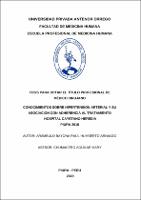Mostrar el registro sencillo del ítem
Conocimientos sobre hipertensión arterial y su asociación con adherencia al tratamiento Hospital Cayetano Heredia-Piura 2018
| dc.contributor.advisor | Chumacero Aguilar, Mary | |
| dc.contributor.author | Arámbulo Bayona, Raúl Humberto Arnaldo | |
| dc.creator | Arámbulo Bayona , Raúl Humberto Arnaldo | |
| dc.date.accessioned | 2020-03-05T03:15:20Z | |
| dc.date.available | 2020-03-05T03:15:20Z | |
| dc.date.issued | 2020 | |
| dc.identifier.uri | https://hdl.handle.net/20.500.12759/6052 | |
| dc.description.abstract | Objetivo: Determinar si los conocimientos sobre hipertensión arterial afectan la adherencia al tratamiento farmacológico para hipertensión arterial en los pacientes diagnosticados de la misma; en la ciudad de Piura, durante el año 2018. Metodología: El presente estudio es de tipo analítico, observacional, retrospectivo, de corte transversal, en el cual se aplicaron el test validado de Morisky Green Levine y el cuestionario validado de conocimientos sobre hipertensión arterial a pacientes diagnosticados y medicados para HTA de los consultorios externos de cardiología y medicina interna del hospital III Cayetano Heredia de Piura durante el año 2018. Resultados: El estudio revela que los conocimientos sobre hipertensión arterial si afectan la adherencia farmacológica de los pacientes hipertensos (significancia de 0.001), el sexo es una variable que no tiene asociación estadísticamente significativa con la adherencia al tratamiento farmacológico ni con el grado de conocimiento sobre HTA. Además un 63.9% de los participantes del estudio tienen una adecuada adherencia al tratamiento farmacológico de su padecimiento, un 55.7% de los mismos tiene un conocimiento adecuado de la enfermedad, mientras que sólo un 40.9% de los sujetos de estudio tiene adherencia adecuada y conocimiento pertinente de su padecimiento en forma simultánea. Conclusión: Los adecuados conocimientos sobre hipertensión arterial influyen de manera positiva en la adherencia farmacológica de los pacientes hipertensos, considerando a los conocimientos sobre hipertensión arterial un factor protector para la adherencia al tratamiento farmacológico (OR = 2.55). Además el sexo del paciente es una variable que no se relaciona ni con el grado de conocimiento sobre la enfermedad, ni con la adherencia al tratamiento farmacológico. Todo esto deduce la importancia de la educación al paciente, pues al ser la HTA una enfermedad crónica, la mejor de la adherencia se traduce en la disminución de la incidencia y/o prevalencia de complicaciones a largo plazo, lo cual se verá reflejado en la mejora de indicadores como años de vida potencialmente perdidos por enfermedad. | es_PE |
| dc.description.abstract | Objective: Determine whether knowledge about high blood pressure affects adherence to drug treatment for high blood pressure in patients diagnosed with it; in the city of Piura, during the year 2018. Methodology: The present study is of an analytical, observational, retrospective, cross-sectional type, in which the validated Morisky Green Levine test and the validated questionnaire of knowledge about arterial hypertension were applied to patients diagnosed and medicated for AHT of the external cardiology offices and internal medicine of the III Cayetano Heredia de Piura hospital during 2018. Results: The study reveals that knowledge about arterial hypertension does affect the pharmacological adherence of hypertensive patients (significance of 0.001), sex is a variable that has no statistically significant association with adherence to pharmacological treatment or the degree of knowledge about Up. In addition, 63.9% of the study participants have adequate adherence to the pharmacological treatment of their condition, 55.7% of them have adequate knowledge of the disease, while only 40.9% of the study subjects have adequate adherence and knowledge relevant of your condition simultaneously. Conclusion: Adequate knowledge of hypertension positively influences the pharmacological adherence of hypertensive patients, considering knowledge about arterial hypertension a protective factor for adherence to pharmacological treatment (OR = 2.55). In addition, the patient's sex is a variable that is not related to either the degree of knowledge about the disease, or the adherence to drug treatment. All of this deduces the importance of patient education, since HTA is a chronic disease, the best adherence results in a decrease in the incidence and / or prevalence of long-term complications, which will be reflected in the Improvement of indicators such as life years potentially lost due to illness. | en_US |
| dc.description.uri | Tesis | es_PE |
| dc.format | application/pdf | es_PE |
| dc.language.iso | spa | es_PE |
| dc.publisher | Universidad Privada Antenor Orrego - UPAO | es_PE |
| dc.relation.ispartofseries | T_MEDP_145 | |
| dc.rights | info:eu-repo/semantics/openAccess | es_PE |
| dc.source | Universidad Privada Antenor Orrego | es_PE |
| dc.source | Repositorio Institucional - UPAO | es_PE |
| dc.subject | Hipertensión arterial | es_PE |
| dc.subject | Adherencia al tratamiento | es_PE |
| dc.subject | Conocimiento de la enfermedad | es_PE |
| dc.subject | Tratamiento farmacológico | es_PE |
| dc.subject | Factor protector | es_PE |
| dc.title | Conocimientos sobre hipertensión arterial y su asociación con adherencia al tratamiento Hospital Cayetano Heredia-Piura 2018 | es_PE |
| dc.type | info:eu-repo/semantics/bachelorThesis | es_PE |
| thesis.degree.level | Título Profesional | es_PE |
| thesis.degree.grantor | Universidad Privada Antenor Orrego. Facultad de Medicina Humana | es_PE |
| thesis.degree.name | Médico Cirujano | es_PE |
| thesis.degree.discipline | Medicina Humana | es_PE |
Ficheros en el ítem
Este ítem aparece en la(s) siguiente(s) colección(es)
-
Medicina Humana [2717]

